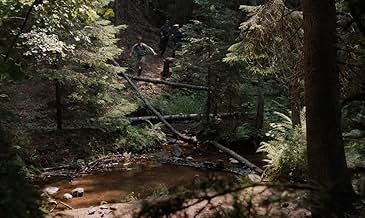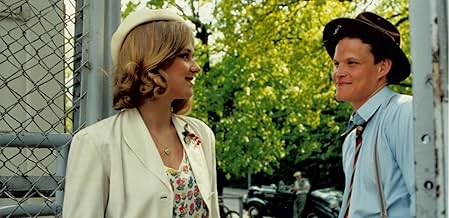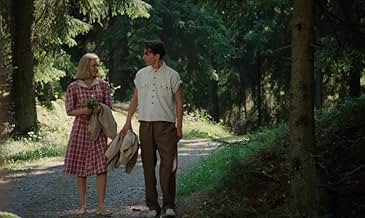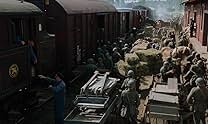1939
- 1989
- 3h 13min
CALIFICACIÓN DE IMDb
6.1/10
1.1 k
TU CALIFICACIÓN
Agrega una trama en tu idiomaWorld War II through the eyes of a Stockholm waitress.World War II through the eyes of a Stockholm waitress.World War II through the eyes of a Stockholm waitress.
- Dirección
- Guionistas
- Elenco
Opiniones destacadas
The title is a misnomer ,for the story spans the whole WW2 till the allies' victory.
"1939" is essentially a chronicle ,in a country that maintained their policy of neutrality ,but breached it in favor of the German , later the allies ;these troubled time are seen through the eyes of a young blond girl (Helene Egehund ) and the best thing in this sometimes sprawling slow-moving work is the depiction of a female friendship ,a subject much less broached than the male one) ; the marvelous Helena Bergström almost steals the show from the principal ,and although their relationship is pure and platonic, it sets a pattern for today's women who live with a child (when Peter is stricken by croup ,both girls show that the baby has two moms: when Berit speaks to the thespian , in the background , the director does not use the usual code).
Churchill once said that the country "played both sides for profit ";it is certainly true for Bengt's family whose business with the Germans was thriving but who was searching new markets when the Nazi 's star faded ;the sames goes for the owner of the chic restaurant where "Arbeit macht frei ". But it also happened in occupied countries where there were collaborators too.
Too bad the other side ,represented by the heroine's cousin ,a socialist who 's sent to a labor camp ,is underwritten .
Bengt , Annika 's husband certainly embraced the Nazi's obnoxious ideology ,when he lets his friends check if his wife is really an Aryan .Annika will always be an intruder in her family-in-law (the scene of the restaurant where she works and where her future father-in-law snubs her is revealing); when she leaves him and Berit does not let the brute in , they take a rebel stand at a time feminism did not exist ;as I wrote , the Berit/Annika relationship is the raison d'être of the film .
"1939" is essentially a chronicle ,in a country that maintained their policy of neutrality ,but breached it in favor of the German , later the allies ;these troubled time are seen through the eyes of a young blond girl (Helene Egehund ) and the best thing in this sometimes sprawling slow-moving work is the depiction of a female friendship ,a subject much less broached than the male one) ; the marvelous Helena Bergström almost steals the show from the principal ,and although their relationship is pure and platonic, it sets a pattern for today's women who live with a child (when Peter is stricken by croup ,both girls show that the baby has two moms: when Berit speaks to the thespian , in the background , the director does not use the usual code).
Churchill once said that the country "played both sides for profit ";it is certainly true for Bengt's family whose business with the Germans was thriving but who was searching new markets when the Nazi 's star faded ;the sames goes for the owner of the chic restaurant where "Arbeit macht frei ". But it also happened in occupied countries where there were collaborators too.
Too bad the other side ,represented by the heroine's cousin ,a socialist who 's sent to a labor camp ,is underwritten .
Bengt , Annika 's husband certainly embraced the Nazi's obnoxious ideology ,when he lets his friends check if his wife is really an Aryan .Annika will always be an intruder in her family-in-law (the scene of the restaurant where she works and where her future father-in-law snubs her is revealing); when she leaves him and Berit does not let the brute in , they take a rebel stand at a time feminism did not exist ;as I wrote , the Berit/Annika relationship is the raison d'être of the film .
1939 was a major project in the Swedish film industry. The Swedish people were invited to send in short descriptions of their own experiences during the war. The events depicted in the film are based on these stories. The main character, Annika, is based on a woman in real life, who travelled from Värmland to Stockholm to start a new life.
The film does create plausible images of what went on in Sweden during the war. The film also illustrates a time of transition, both for the world (from the old, safe environment to a new, unsecure one with prospects and dangers) and for the young people, who were forced to grow up quickly during this violent period of time. Everyone had to decide how to relate to the new world and what to do about their personal roots and beliefs. This is why I find the film so interesting.
I agree that 1939 can be considered slow at times, but I also happen to think that it is a tempo which suits the tale that is told. In my book, the key line is during one of the slower moments, when Annika's father says to Annika something along the lines of: "I am afraid of what's coming. Don't forget the old ways, Annika. Don't forget the way we used to live." Looking out over the meadows of his home, he realises that he is being left behind by the development, and that Annika and her peers are left at the helm. For me it is a thoroughly moving moment in the film. With the fast pace that we are living today, we would all do well to heed his plea.
This film didn't get the credit I think it merited, and at least for us Swedes 1939 should be considered an important film.
The film does create plausible images of what went on in Sweden during the war. The film also illustrates a time of transition, both for the world (from the old, safe environment to a new, unsecure one with prospects and dangers) and for the young people, who were forced to grow up quickly during this violent period of time. Everyone had to decide how to relate to the new world and what to do about their personal roots and beliefs. This is why I find the film so interesting.
I agree that 1939 can be considered slow at times, but I also happen to think that it is a tempo which suits the tale that is told. In my book, the key line is during one of the slower moments, when Annika's father says to Annika something along the lines of: "I am afraid of what's coming. Don't forget the old ways, Annika. Don't forget the way we used to live." Looking out over the meadows of his home, he realises that he is being left behind by the development, and that Annika and her peers are left at the helm. For me it is a thoroughly moving moment in the film. With the fast pace that we are living today, we would all do well to heed his plea.
This film didn't get the credit I think it merited, and at least for us Swedes 1939 should be considered an important film.
Sweden was one of the safest countries during ww2 in Europe after Iceland and Portugal. A movie centered around the life of a woman during said war in Sweden needs a more interesting plot to compensate for the dullness of the events that concerned Sweden in that time.
That plot never happened. It's simply a story about a young woman and some sad realities of life that could have happened regardless of whether or not a war was ongoing
As a sort of documentary this would have been a 9, but they tried to make it a movie. 3h long as well. Not worth your time if you don't at least enjoy modern history.
That plot never happened. It's simply a story about a young woman and some sad realities of life that could have happened regardless of whether or not a war was ongoing
As a sort of documentary this would have been a 9, but they tried to make it a movie. 3h long as well. Not worth your time if you don't at least enjoy modern history.
This is a very decent movie, following the life of a waitress during the second world war in neutral Sweden. It's pretty cool to see how things went in Sweden in that time. I know this isn't a documentary, but still... Don't expect lots of action and suspense, but everyday struggles between a country girl and a city boy. Great acting and a good story...
This film is probably one of the most well-made films Sweden has ever produced. It's serious, it's truthful and believable and it really depicts life in Sweden during the WW2. I'm from Värmland myself, so that part of the film seems most important to me. Many swedes lived with the Third Reich as neighbors during the occupation, and it's a clever touch to include the shooting of some people trying to make it to Sweden.
I also have to point out that my single appearance in any film so far, is at the train station when the father leaves to do military service. See the hats of the little boys running around in the crowd? One of them is me :)
Anyway, well made, and it really shows that this was the most expensive Swedish film to date. Somewhat slow, though.
I also have to point out that my single appearance in any film so far, is at the train station when the father leaves to do military service. See the hats of the little boys running around in the crowd? One of them is me :)
Anyway, well made, and it really shows that this was the most expensive Swedish film to date. Somewhat slow, though.
¿Sabías que…?
- TriviaFeature film debut of both Helene Egelund and Per Morberg.
- ErroresWhen Annika travels home to her parents for Christmas, you see an aerial view of the train going through the woods. In the lower right corner of the screen you can see a part of the landing railing of the helicopter from which the scene was filmed.
- Créditos curiososThe closing credits include an unusual job description: "Helena Olofsson-Carmback (as Helena Carmback) .... Shouting and whispering"
- ConexionesEdited into Max Manus (2008)
Selecciones populares
Inicia sesión para calificar y agrega a la lista de videos para obtener recomendaciones personalizadas
- How long is 1939?Con tecnología de Alexa
Detalles
Taquilla
- Presupuesto
- SEK 30,000,000 (estimado)
- Tiempo de ejecución
- 3h 13min(193 min)
- Mezcla de sonido
- Relación de aspecto
- 1.66 : 1
Contribuir a esta página
Sugiere una edición o agrega el contenido que falta





























